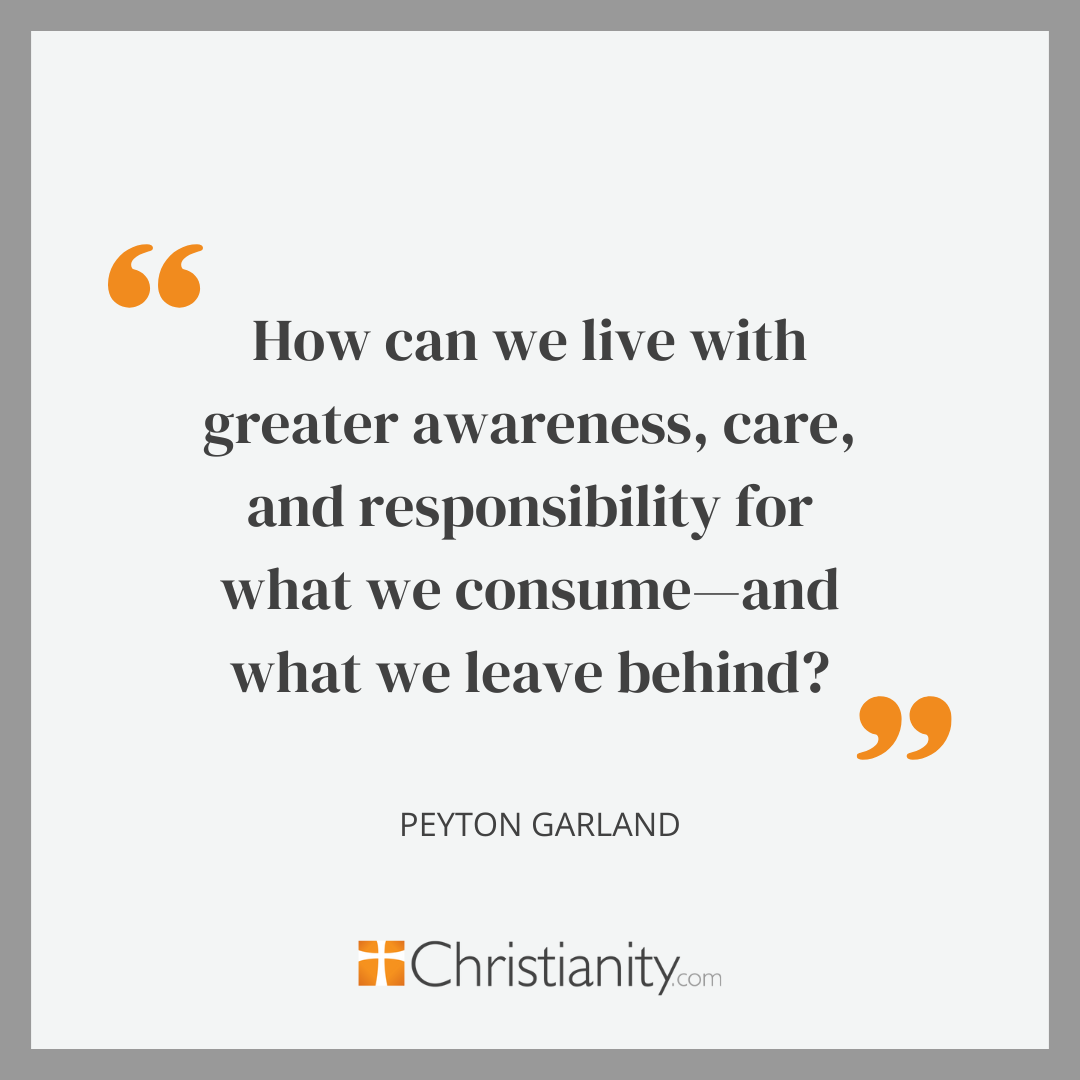In 2019, the World Wildlife Fund, the world’s largest conservation organization, located in Australia, asked the University of Newcastle to conduct a study that revealed alarming findings. Humans consume five grams of microplastic weekly, and while this might sound insignificant, five grams is roughly the weight of a credit card. In elementary terms, humans are eating a credit card’s worth of plastic every seven days.
Microplastics are plastic particles usually smaller than five millimeters that contaminate the earth’s environment… and our bodies. Common microplastics are found in plastic water bottles, disposable coffee cups, synthetic clothes, and even makeup. Unfortunately, these microplastics are everywhere in our air and water, making it impossible for us to avoid their harm.
For many, conversations centered on taking care of our planet feel political, but the manipulation of a topic shouldn’t keep us from it. Moreso, as Christians, we can’t deny one of God’s earliest mandates to people, that we honor creation by taking care of it.
Genesis 1:28 says, “God blessed them and said to them, ‘Be fruitful and multiply and fill the earth and subdue it…’” In a fallen world, the verb “subdue” is often viewed through a militaristic lens, seen as a call to overpower and dominate a people or thing by brutal force. However, in a world before sin, we must understand that man’s mandate to subdue the earth was a call to ensure that her goodness was respected and protected. It was a perfect command, so, as believers who long for the New Heaven and New Earth Jesus will one day create (Revelation 21:1), why do we ignore a command that would allow our world to better reflect that hopeful perfection?
In light of this command, and in light of the undeniable truth that we live in a world filled with unseen harm, how can we live with greater awareness, care, and responsibility for what we consume—and what we leave behind?
Refuse to Be Ignorant
Ignorance is bliss because it breeds a false sense of contentment. What we don’t know doesn’t require us to change the way we think, behave, and interact with others. Thus, it’s easy to accept the lie that things are going just fine because that’s how they’ve always been. The norm and the routine become our comfort zones, and, often, when someone pushes back against our comfy rhythms, it’s easy to become defensive.
It’s one thing to vehemently defend the truth. It’s another thing to be defensive of yourself when you simply don’t want to process what someone else is saying. The first is noble, the latter prideful. The first refines your character, but the second doesn’t require that you have any character at all, only that you stay true to your opinions—regardless of bias or ignorance.
Friends, fellow believers, refuse to be ignorant regarding the mandate God has bestowed to tend to the earth. Don’t negate the natural procession that caring for the earth likewise requires that we care for each other and our bodies.
If you’ve grown up in the church, you might roll your eyes or simply gloss over the reminder that your body is a temple. 1 Corinthians 6:19 says, “Do you not know that your body is a temple of the Holy Spirit, who is in you, whom you have received from God? You are not your own.” But need I also remind you how often you require or pay for that same expectation of others?
You pay extra for the Air BnB because its cleanliness meets the top standards. It has all the safety features in the home, including a carbon monoxide detector.
You pick a certain man or woman for the church’s softball team because you know they hit the gym every week.
You like, and sometimes demand, that people take care of things, almost to a point of perfection, but when it comes to yourself, how often do you brush off maintaining your temple under the guise, “God never asked me to be perfect!”?
Don’t allow the idea of “bliss” to make you lazy, ignoring God’s loving requirement that we take care of the earth, including others and ourselves. Instead, honor the world by making conscious decisions to limit your use of plastic, utilize your county’s local recycling center, and care for your body, whether through daily exercise, swapping to an organic makeup, or changing your coffee with espresso to an herbal tea.
Ignorant bliss rarely lasts, so why not take a few moments to shake off the false sense of comfort and do some good for your planet, those around you, and yourself?

Make Peace with Living in a Fallen World
To have a healthy relationship with others, yourself, and the earth you live in, you must make peace with living in a fallen world. This doesn’t mean that you like the imperfections, and this doesn’t mean you ignore them. Please, don’t ignore them! However, making peace with a world that won’t be made whole until Christ returns requires you to:
1. Stay aware.
Just the opposite of sticking your head in the sand, peace requires that you accept reality and willingly do the proper research to learn how to make healthier choices. When I had my son, I quickly learned that it would be so much easier—so much more “blissful”—if I never read a single ingredient label on his baby food and snacks. But to truly honor his little body the way God asks requires that I face the hard truth that it’s often best (not easiest) if I make most of his food from scratch. While this small willingness to wrestle with the truth doesn’t save the entire planet or keep the world from ingesting plastic, it does allow me to instill in my son the ideas of healthy living, of recognizing what is and isn’t good for our bodies, our air, and our environment.
2. Stay humble.
Just as you must stay aware so you can make healthier decisions, you must stay humble, understanding that perfection will never be met on this side of heaven. Certainly, this isn’t an excuse to do nothing. Instead, it’s the launching pad for true boldness that lets you dare to do big things because you know, even if you fail, you are met with grace. You have an eternal safety net that allows you to try hard things without fearing that failure is the end of your story.
With that in mind, I encourage you to find ways to make an environmental difference in your homes and communities. In my home, we recently made the decision to rid our kitchen of plastic and silicone cooking and eating utensils, opting for stoneware and glass. In the community, it might look like supporting the local wildlife reserve or volunteering with your church to do a local lake cleanup. My family is part of a homesteading community group, where we encourage one another in farming endeavors that reduce pesticides and chemicals and, instead, promote cleaner soil, cleaner food, and cleaner products for local consumers.
Rejoice in What’s Good
I recently accepted that holiness and joyfulness can be synonymous. In Christian culture, we so easily believe holiness requires that we abandon fun and adventure, that we must never strive to find happiness in life’s little moments. But friends, Christ came to give us a full life, one brimming with joy and hope and beautiful things (John 10:10), and this means we can find true, God-given joy in tending to our planet and our bodies.
Now, this doesn’t mean we go on a witch hunt for those who view climate control differently, this doesn’t mean we wage Facebook wars when others have differing opinions about whether a healthier lifestyle is vegan or meat-based, and this doesn’t mean we become so obsessed with trying to make the earth plastic-free that we forget living in a fallen world makes this feat not only impossible but wasteful.
Instead, joy might look like planting trees with friends at the local park, getting your life group together for a day of planting veggies, hosting a recycling party for your child’s class, or even creating crafts to raise funds for the local zoo or wildlife reserve.
In 2020, before COVID-19 entered our world, Australia experienced devastating fires that destroyed its environment. Living in the U.S., I felt there wasn’t much I could do, but what I was able to do was pay for a beautiful coffee-painted picture of a wombat, an Australian native animal, created by a local artist who donated all proceeds to those taking care of the animals whose homes were destroyed by the fires.
You see, wombats were recorded herding animals of all kinds together, with flames all around, and leading them to their underground burrows, where they would be safe from the fires. These wombats saved countless animal lives, and to this day, I find joy in knowing that I made a small contribution to those tending to these little wombats, who often convict and remind me of what bravery and anti-prejudice truly mean.
This, friends, is the fullness of life we can find when we face the truth and do something to help, as we rest in the lessons we can learn despite navigating a broken planet.
I urge you to discover adventure, joy, and even peace in the responsibility to care for the planet, in leaving a legacy of not only healthiness but holiness and joy for the next generation.
Photo Credit: ©Unplash/Markus Winkler



.jpg)

